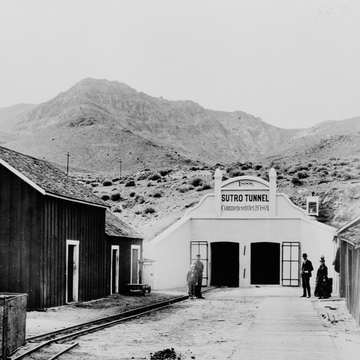Although several surviving buildings in the townsite of Sutro date from the nineteenth century, the most famous expression of the area's history is its much-photographed tunnel entrance. The tunnel continues to provide passive drainage to the 1,600-foot level of the mines beneath Virginia City, and it is possible to walk hundreds of yards into the precisely excavated tunnel. An elaborate brick facade, coated in plaster and whitewash, decorates the mouth of the tunnel. With its parapet and twin gated portals, the image of the Sutro Tunnel opening has become synonymous with the technological innovations and industrial might of the Comstock. This facade replaced a simpler one in 1888, long after the Comstock mines had slumped and the Sutro Tunnel had failed to realize its creator's expectations.
You are here
Sutro Tunnel
1869–1878, 1888. Sutro Rd., approximately 3 miles north of Dayton along U.S. 50, then about 1 mile west of U.S. 50
If SAH Archipedia has been useful to you, please consider supporting it.
SAH Archipedia tells the story of the United States through its buildings, landscapes, and cities. This freely available resource empowers the public with authoritative knowledge that deepens their understanding and appreciation of the built environment. But the Society of Architectural Historians, which created SAH Archipedia with University of Virginia Press, needs your support to maintain the high-caliber research, writing, photography, cartography, editing, design, and programming that make SAH Archipedia a trusted online resource available to all who value the history of place, heritage tourism, and learning.





